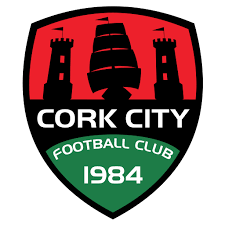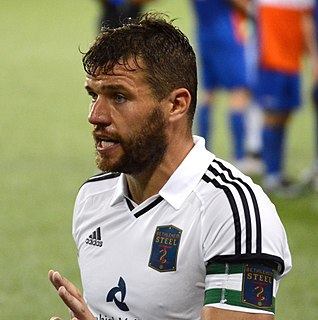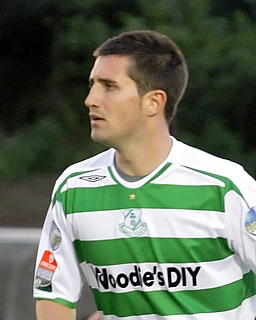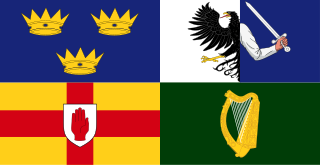
Cork City Football Club is an Irish association football club based in Cork. The club currently plays in the League of Ireland Premier Division. The club was founded and elected to the League of Ireland in 1984. It was one of the first clubs in Ireland to field a team of professional footballers. With the progression of professionalism at the club, continued development of the Turners Cross stadium and the transition to summer football, the club became one of the biggest and best supported clubs in the country. In 2008, financial issues resulted in a period of examinership, and the club's then holding company was wound-up in 2010. A team was entered into the 2010 League of Ireland First Division, before the club re-acquired rights to the name "Cork City Football Club", and was promoted back to the premier division for the 2012 season. Cork City FC won its third premier division title, and first FAI Cup double, during the 2017 season.

St Patrick's Athletic F.C. is an Irish association football club based in Inchicore, Dublin, that plays in the Irish Premier Division. Founded in May 1929, they played originally in the Phoenix Park but they moved to their current ground Richmond Park in 1930.
Alan Mathews is a former Irish football player and manager.
Glen Crowe is an Irish professional football forward who currently plays for Malahide United in the Leinster Senior League. He was a prolific goalscorer in the League of Ireland Premier Division and has represented the Republic of Ireland national football team on two occasions.
The 2007 League of Ireland Premier Division was the 23rd season of the League of Ireland Premier Division. The division was made up of 12 teams. Drogheda United were champions for the first time while St Patrick's Athletic finished as runners-up.

Wexford Football Club is an Irish association football club based in Crossabeg, County Wexford. They compete in the League of Ireland First Division. The club joined the league after being awarded a First Division licence for the 2007 League of Ireland season. The opportunity to join the League of Ireland arose as Dublin City became bankrupt before the end of the 2006 season, leaving an uneven number of clubs. The 2007 season coincided with the takeover of the running of the league by the FAI and all existing clubs had to apply for entry into what was effectively a new league. Limerick was the only existing club refused a licence and so Wexford Youths and Limerick 37 were admitted to the new league. The club alternate their colours between plain black and pink and black. The club rebranded for the start of the 2017 season by dropping the 'Youths' from their title and changing the club crest.

James Chambers, born 14 February 1987 in Dublin, is an Irish footballer, currently playing for Bethlehem Steel in the United Soccer League.

Stephen Paisley is an Irish professional football player currently without a club. Paisley is a central defender. Signed for St.Mochtas of the Leinster Senior League July 2014.

Mark Leech, is an Irish footballer who played for various clubs in the League of Ireland including St. Patricks Athletic, Drogheda and Shamrock Rovers and is the son of former Shamrock Rovers and Republic of Ireland international Mick Leech.
The League of Ireland XI, more recently referred to as the Airtricity League XI for sponsorship reasons, is the representative team of the League of Ireland, the national association football league of the Republic of Ireland. For much of its history, the League of Ireland XI has effectively acted as a reserve or B team to the senior Republic of Ireland national team, providing international representative honours to home-based players. In fact it has played considerably more games than the actual Republic of Ireland B national football team. In addition to playing regular games against similar representative teams, such as the Irish League XI, the Scottish Football League XI and the Football League XI, the League of Ireland XI has also played in prestige friendlies against the full national teams of both Argentina and Brazil. The League of Ireland XI also represented Ireland in the qualifying stages of the 1988 Olympic Football Tournament. More recently a League of Ireland U-23 XI has represented the Republic of Ireland in the International Challenge Trophy. Meanwhile, a senior team with no age or nationality restriction regularly plays visiting club sides. More recently the team competed in the 2011 Dublin Super Cup

The Football Association of Ireland is the governing body for association football in the Republic of Ireland.

Sporting Fingal Football Club was an Irish association football club based in Fingal. Between 2008 and 2010, the club played three seasons in the League of Ireland. During their first two seasons they played in the First Division before winning promotion to the Premier Division. During the 2009 and 2010 seasons, the club also entered a team in the A Championship. During their short stay in the League of Ireland, Sporting Fingal were relatively successful. As well as gaining promotion to the Premier Division, they also won both the 2009 FAI Cup and the 2010 A Championship Cup and qualified for the UEFA Europa League on two occasions. In addition to fielding teams in the League of Ireland, Sporting Fingal also organised Powerchair Football, Special Olympics football and futsal teams. Their futsal team won the 2010 FAI Futsal Cup and qualified for the 2010–11 UEFA Futsal Cup.
The A Championship, also known as the Newstalk A Championship, was an association football league featuring League of Ireland reserve teams and emerging senior teams. It was a third level league in the Republic of Ireland football league system. It was formed in 2008 and disbanded following the 2011 season. Between 2009 and 2011 the league was sponsored by Newstalk. It was effectively absorbed into the League of Ireland U19 Division.

The Football Association of Ireland Women's Cup is the senior cup competition for women's association football in the Republic of Ireland. It is commonly known as the Women's FAI Cup, the WFAI Cup, or prior to 2001, the Ladies FAI Cup or the LFAI Cup. Organised by the Women's Football Association of Ireland, like the Women's National League, the Cup is currently sponsored by Continental Tyres and is known as the Continental Tyres Women's Senior Cup. It has previously been sponsored by Umbro and Brother International.
The Women's National League is the top level league for women's association football in the Republic of Ireland. It is organised by the Football Association of Ireland and the Women's Football Association of Ireland. The FAI/WFAI previously organised a women's national league known as the Ladies League of Ireland or the Woman's League of Ireland during the 1970s and 1980s. The current league was founded in 2011 and the inaugural winners were Peamount United. The winners qualify for the UEFA Women's Champions League.
The President of Ireland's Cup, also known simply as the President's Cup, is an association football super cup featuring clubs from the Republic of Ireland football league system. It is a play-off between the winners of the previous season's League of Ireland Premier Division and the FAI Cup. Because it is organised by the Football Association of Ireland, it is sometimes misleadingly referred to as the FAI President's Cup. However the president in the title refers to the President of Ireland and not the president of the FAI. The FAI has previously organised similar competitions, the Top Four Cup and the FAI Super Cup. A similarly named and formatted competition, the LFA President's Cup was organised by the Leinster Football Association.
St Francis Ladies Football Club is an Irish association football club based in Baldonnel, Dublin. It is the women's section of St Francis F.C.. They have entered teams in both the FAI Women's Cup and the Dublin Women's Soccer League. They also represented the Republic of Ireland in the 2009–10 and 2010–11 UEFA Women's Champions Leagues.
Dundalk Women's Football Club is an Irish association football club based in Dundalk, County Louth. They are the women's team of Dundalk F.C.. They currently play in the Dublin Women's Soccer League. They represented the Republic of Ireland in the 2006–07 UEFA Women's Cup. An earlier Dundalk F.C. women's team also competed in the Ladies League of Ireland during the 1970s.

Andrew Boyle is an Irish professional footballer, who primarily plays as a centre-back. Boyle currently plays for Ross County, on loan from Preston North End. He has previously played for League of Ireland sides Dundalk, UCD and Shelbourne, and Scottish club Dundee. With Dundalk, Boyle was the team's vice-captain and was part of the first Irish side to reach the play-off round of the UEFA Champions League in August 2016.















